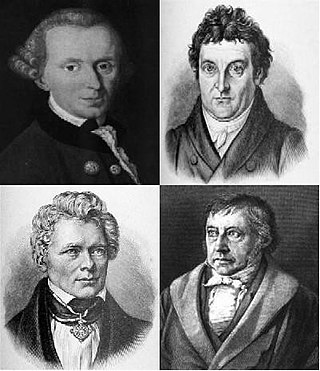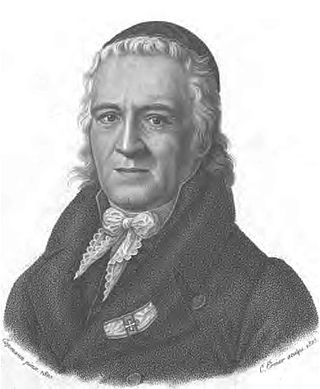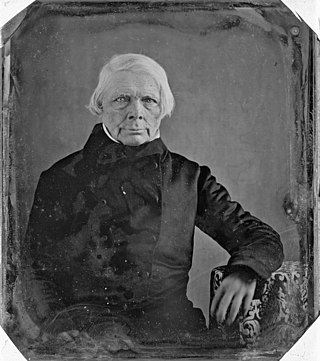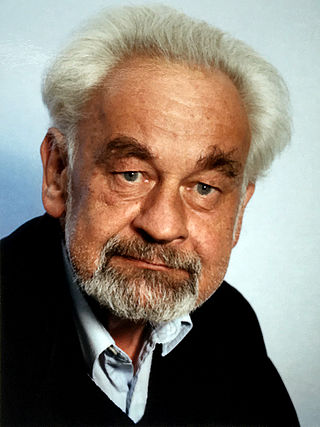
Johann Gottlieb Fichte was a German philosopher who became a founding figure of the philosophical movement known as German idealism, which developed from the theoretical and ethical writings of Immanuel Kant. Recently, philosophers and scholars have begun to appreciate Fichte as an important philosopher in his own right due to his original insights into the nature of self-consciousness or self-awareness. Fichte was also the originator of thesis–antithesis–synthesis, an idea that is often erroneously attributed to Hegel. Like Descartes and Kant before him, Fichte was motivated by the problem of subjectivity and consciousness. Fichte also wrote works of political philosophy; he has a reputation as one of the fathers of German nationalism.

Johann Christian Friedrich Hölderlin was a German poet and philosopher. Described by Norbert von Hellingrath as "the most German of Germans", Hölderlin was a key figure of German Romanticism. Particularly due to his early association with and philosophical influence on Georg Wilhelm Friedrich Hegel and Friedrich Wilhelm Joseph Schelling, he was also an important thinker in the development of German Idealism.

Friedrich Wilhelm Joseph Schelling, later von Schelling, was a German philosopher. Standard histories of philosophy make him the midpoint in the development of German idealism, situating him between Johann Gottlieb Fichte, his mentor in his early years, and Georg Wilhelm Friedrich Hegel, his one-time university roommate, early friend, and later rival. Interpreting Schelling's philosophy is regarded as difficult because of its evolving nature.

German idealism is a philosophical movement that emerged in Germany in the late 18th and early 19th centuries. It developed out of the work of Immanuel Kant in the 1780s and 1790s, and was closely linked both with Romanticism and the revolutionary politics of the Enlightenment. The period of German idealism after Kant is also known as post-Kantian idealism or simply post-Kantianism. One scheme divides German idealists into transcendental idealists, associated with Kant and Fichte, and absolute idealists, associated with Schelling and Hegel.

Absolute idealism is chiefly associated with Friedrich Schelling and G. W. F. Hegel, both of whom were German idealist philosophers in the 19th century. The label has also been attached to others such as Josiah Royce, an American philosopher who was greatly influenced by Hegel's work, and the British idealists.

Wilhelm Traugott Krug was a German philosopher and writer. He is considered to be part of the Kantian School of logic.

Karl Leonhard Reinhold was an Austrian philosopher who helped to popularise the work of Immanuel Kant in the late 18th century. His "elementary philosophy" (Elementarphilosophie) also influenced German idealism, notably Johann Gottlieb Fichte, as a critical system grounded in a fundamental first principle.

Naturphilosophie is a term used in English-language philosophy to identify a current in the philosophical tradition of German idealism, as applied to the study of nature in the earlier 19th century. German speakers use the clearer term Romantische Naturphilosophie, the philosophy of nature developed at the time of the founding of German Romanticism. It is particularly associated with the philosophical work of Friedrich Wilhelm Joseph Schelling and Georg Wilhelm Friedrich Hegel—though it has some clear precursors also. More particularly it is identified with some of the initial works of Schelling during the period 1797–9, in reaction to the views of Fichte, and subsequent developments from Schelling's position. Always controversial, some of Schelling's ideas in this direction are still considered of philosophical interest, even if the subsequent development of experimental natural science had a destructive impact on the credibility of the theories of his followers in Naturphilosophie.
Ernst Tugendhat was a Czechoslovak-born German philosopher. He was a scion of the wealthy and influential Jewish Tugendhat family. They lived in Venezuela during the Nazi regime, and he studied first in Stanford University, then in Freiburg. He taught internationally in Europa and South America, with a focus on language analysis.
Manfred Frank is a German philosopher, emeritus professor of philosophy at the University of Tübingen. His work focuses on German idealism, romanticism, and the concepts of subjectivity and self-consciousness. His 950-page study of German romanticism, Unendliche Annäherung, has been described as "the most comprehensive and thoroughgoing study of early German romanticism" and "surely one of the most important books from the post-War period on the history of German philosophy." He has also written at length on analytic philosophy and recent French philosophy.

The following list of works by German philosopher Georg Wilhelm Friedrich Hegel (1770–1831).
"The Oldest Systematic Program of German Idealism" is a fragmentary 1796/97 essay of unknown authorship. The document was first published by Franz Rosenzweig in 1917. An English translation was made by Diana I. Behler.
The following is a list of the major events in the history of German idealism, along with related historical events.

Vittorio Hösle is an Italian-born German philosopher. He has authored works including Hegels System (1987), Moral und Politik, and Der philosophische Dialog.

Thomas Seebohm was a phenomenological philosopher whose wide-ranging interests included, among others, Immanuel Kant, Edmund Husserl, hermeneutics, and logic. Other areas of Professor Seebohm's interests included the history of philosophy, philosophy of history, philosophy of the formal sciences, methodology and philosophy of the human sciences, the history of 19th century British Empiricism, American pragmatism, analytic philosophy, philosophy of law and practical philosophy, and the development of the history of philosophy in Eastern Europe. Despite this diverse span of interests, Seebohm was chiefly known as a phenomenologist, who "above all...considered himself a creative phenomenologist, who as a critically reflecting philosopher would look at all major issues with which he became confronted, from a transcendental phenomenological point of view."
Wolfgang Cramer was a German philosopher and mathematician.
Terry P. Pinkard is an American philosopher and professor at Georgetown University. His research and teaching focus on the German tradition in philosophy from Kant to the present.
Michael Theunissen was a German philosopher. He was successor to Hans-Georg Gadamer as chair of philosophy at the University of Heidelberg.
Hans Friedrich Fulda was a German philosopher and university lecturer.

Eckart Förster is a German philosopher and university lecturer. He taught as a professor of philosophy at Johns Hopkins University in Baltimore and as an honorary professor at Humboldt University in Berlin until becoming emeritus on January 1, 2021.










